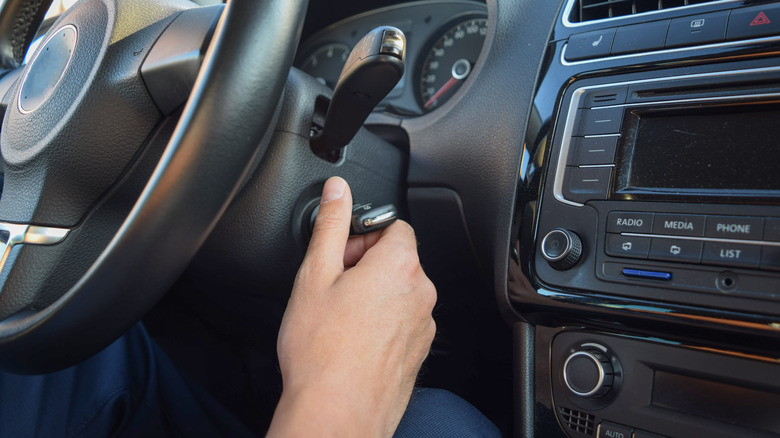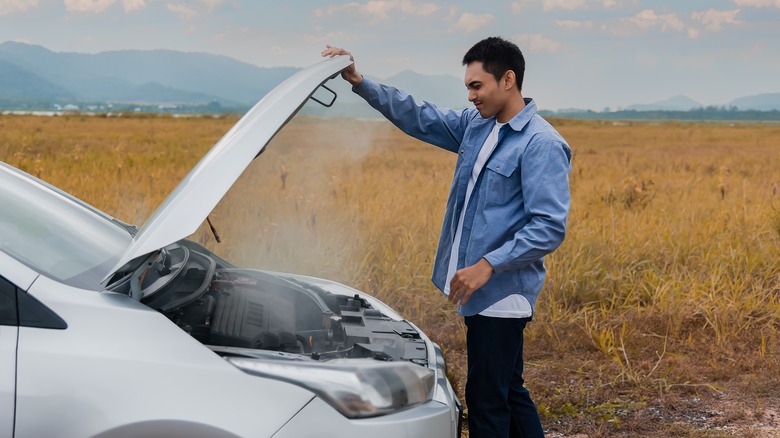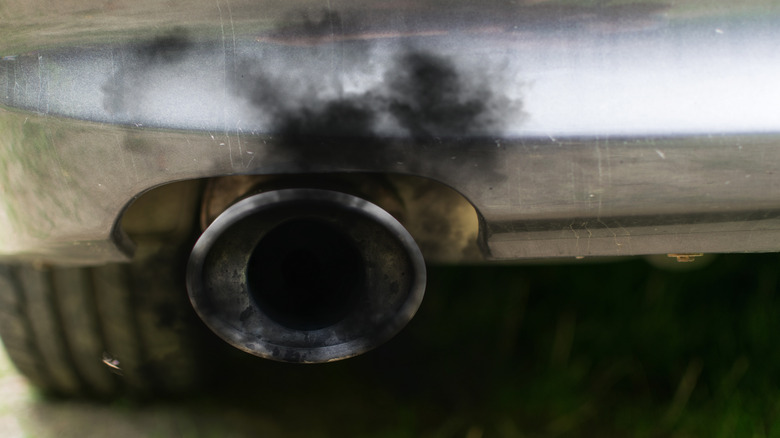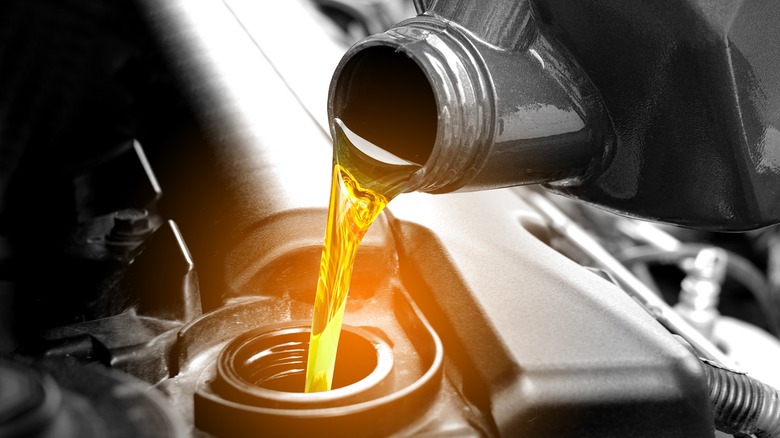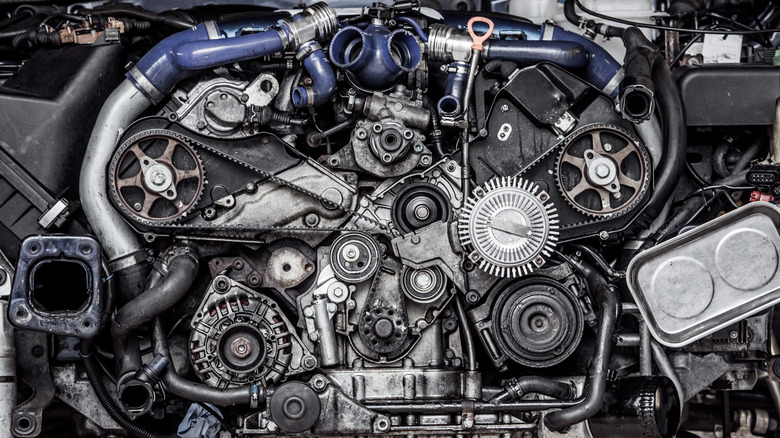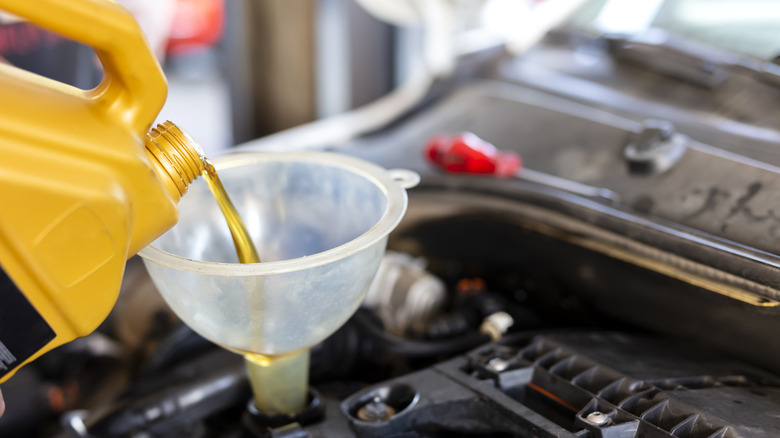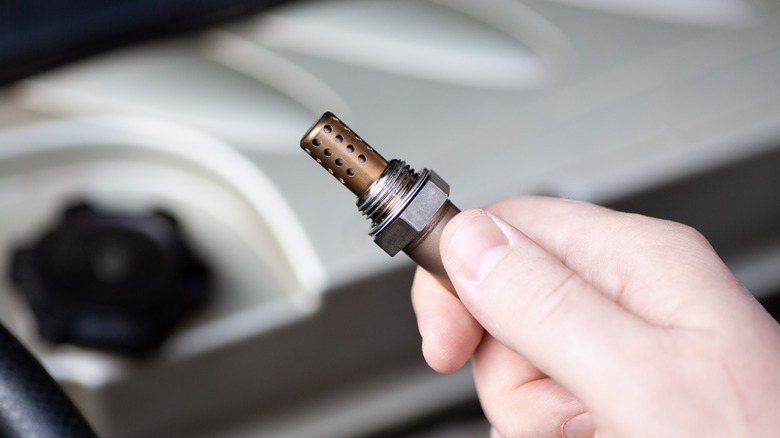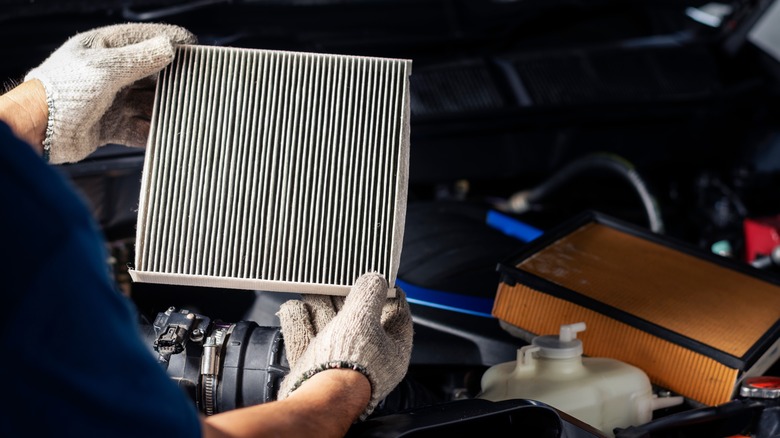8 Common Issues With Small Diesel Engines
When you find yourself in the market for a new vehicle, you may have to pick between a diesel- or gas-powered car. As a fuel, diesel may be a little more expensive than gas, but it comes with a host of benefits. For starters, diesel engines are designed to be more durable than gas ones, and they can often go longer between fuel stops. This holds true whether you get a monstrous diesel engine or one that's a little smaller in size.
These types of engines may be more often affiliated with large trucks, but you may be surprised to learn how many compact cars have diesel engines under the hood. Small diesel engines still don't have spark plugs like what one might find in a gas-powered mechanism. Instead, it creates power through compression by injecting fuel into the compressed air, expelling certain gases in the process. Naturally, since it's smaller, it can't bring in as much air as some of the heavier-duty models, and this results in lower horsepower and torque. But depending on your situation, you may not need a ton to begin with.
Small diesel engines are certainly worth the investment, but it's critical to be aware of common issues that can crop up. With prompt repairs and routine maintenance, you can feel safer in the knowledge your car has a reduced likelihood of having the following problems.
Difficulty starting
You may be in a hurry to get somewhere, only to find that when you try to start your vehicle it takes several attempts or doesn't happen at all. It can be a real pain, and the source can be a variety of problems. There are various tips and tricks to troubleshoot a car that won't start, but for a small diesel engine, there are some things to look at first.
First, you may want to consider looking at the system's glow plugs. Your diesel engine isn't going to have spark plugs, but glow plugs serve a similar purpose in igniting the fuel. Over time, it's possible for glow plugs to get worn out and unable to get the engine going, leading to difficulty starting. You can often tell if the glow plug is the source of the issue by examining the tip to see if it's broken or has dimples forming around it. In either case, it would be time to replace them.
Environmental factors can also negatively impact your small diesel engine. In the event it gets too cold out, the diesel may not be able to flow through the engine easily. Depending on the climate in which you live, it might be a good idea to invest in a fuel additive to increase fluidity. Of course, these are only a couple possible options, and you should look at some other issues on this list to see if those help with starting your car.
Overheating
Without sufficient lubrication and coolant, any engine can begin to overheat. If you notice your small diesel engine beginning to overheat, the first things you need to do include pulling off to the side of the road and cranking the heater to draw that heat away from the engine. Any engine is susceptible to overheating, but smaller ones may get it more often if you're trying to push it past its engine load, like if you're trying to pull something heavy behind your vehicle. Small diesel engines typically offer power-output levels of 252 horsepower or less while larger ones can go up to 600 horsepower.
Your engine may simply need a bit of a break while you recalibrate how much weight you can feasibly haul. It's also still important to look for common overheating sources. For example, you may have a leak within your coolant system, which is preventing the proper materials from circulating throughout your engine to keep it cool. When you find a sweet smell after popping open the hood, you'll want to take your vehicle in to get the leak patched.
Additionally, you'll want to inspect the cooling fan and diesel injectors. Those items going on the fritz can also make it difficult for the engine to regulate its temperature. Be mindful of how much you're requiring out of your vehicle, and if you plan on hauling a lot, it may be more prudent to get a vehicle with a larger diesel engine.
Black exhaust
Black exhaust coming out of your car's tailpipe is a clear indicator something isn't going right with your engine. Oftentimes, it means the fuel isn't getting burned correctly. It can happen to any vehicle, and small diesel engines may experience it if an excessive amount of stress is being placed on the system, preventing a proper ratio of fuel and air from occurring.
You don't want any smoke coming out of your vehicle, and if it happens when you're driving the way you've always done, it's recommended to look at what the other culprits could be. The mass airflow sensor is responsible for ensuring the engine maintains a correct mix of fuel and air, but if it breaks, the ratio will go off, resulting in smoke. The engine air filter may also be to blame — if it gets dirty, it may stop letting enough air into the system.
Part of your vehicle's regular maintenance should include cleaning and replacing such parts at the suggested intervals to avoid black exhaust emitting from the tailpipe in the first place. Not only is black smoke burdensome for everyone else on the road, but if your engine isn't burning fuel properly, you could see other, more problematic issues turn up later.
Fuel contamination
One of the most common problems that diesel engine owners face is fuel contamination. It's paramount never to get confused at the pump and accidentally put gasoline into the system, as this can result in engine issues. However, there are several other ways in which a small diesel engine can face contamination even if you always fill up with diesel.
It may not seem like it, but water can make its way into the system through leaks or condensation if you're not careful. Condensation occurs when it's warmer outside of the tank than it is inside, and when too much water gets inside, it can lead to various parts becoming corroded. Excessive water can also result in bacterial growth, which can further clog up the system and prevent sufficient fuel from getting into the engine. Another danger with water is that when the temperature outside gets cold, it could potentially freeze inside your vehicle.
Any time you suspect your vehicle contains contaminated fuel, your best bet is to flush the system and refill it with completely clean diesel. You should suspect something is off about the fuel if your car begins experiencing engine vibrations, power loss, or significantly reduced mileage.
Excessive noise
It's vital to note that diesel engines are inherently noisier than gas engines. This is due to diesel machines creating louder explosions during the combustion process as well as having a higher compression ratio. Therefore, hearing louder noises than what you might be used to is to be expected, and you shouldn't be concerned so long as the sounds being emitted are consistent. Once you've driven your diesel car for a while, you should become accustomed to its normal sounds. If you hear anything out of the ordinary, it's time to take action.
Small diesel engines are prone to normal wear and tear like anything else, and sometimes, those strange noises happen due to loose nuts and bolts. Those will produce a rattling or vibrating sound within the engine, and in that case, you may simply need to tighten them. On the other hand, strange sounds can also signal an issue within the combustion process if the engine isn't getting the right type of fuel or not enough of the right kind. You can reasonably assume there's a fuel issue when a loud knocking noise comes from the engine, as this indicates the injector being mistimed.
Strange sounds can come from a variety of sources. A professional mechanic can pinpoint the issue if you're having trouble nailing down where it's coming from.
Contaminated lubricants
Diesel engines can need an oil change anywhere from every 3,000 miles to every 10,000, depending on the exact engine and the type of oil you're using. It's critical not to miss a scheduled change, as oil can break down over time, resulting in contaminants getting into your engine and impacting function. It's also recommended to change out the oil filter at regular intervals, too, and you might as well do that with each oil change. Filters can get clogged, preventing sufficient oil from lubricating the engine and causing problems.
But oil isn't the only place where contaminants can degrade your small diesel engine. Similar to how water can get into the gas tank via condensation, the same holds true with water affecting the oil. In fact, through oxidation, engine oil can mix with water and any other contaminants to develop into a thick sludge that will require a full flush to cleanse the engine. Water isn't the only thing to watch out for, as dust and dirt can make their way into various lubricants if there are cracks in the crankcase.
Small diesel engines require regular maintenance, so make sure not to overlook anything, even if your car appears to run fine. It may even be good to bring it in for a check-up if your vehicle was in a particularly dirty environment, like going off-roading, just to make sure nothing happened under your watch.
Sensor issues
Your diesel engine may be small, but it still relies on an assortment of sensors to monitor its various functions and inform you if something breaks. Those sensors are also susceptible to breakage over time, and if they can't monitor your engine getting sufficient fuel and air, you'll develop more severe problems over time. All sensors naturally degrade over time — new oxygen sensors generally lasting for between 60,000 and 90,000 miles, for instance — but other factors can cause a sensor to deteriorate prematurely.
Since diesel engines generate higher compression rates, resulting in more torque, they create a larger output of heat. Excessive exposure to such heat, especially if you're consistently making your car operate at maximum capacity, can lead to sensors breaking down sooner than expected. The same holds true for how diesel engines create more particulate matter, which can clog sensors and not make them as effective at determining correct levels.
It's possible to clean certain sensors, provided you have the right material and are careful. However, improperly cleaning a sensor can actually damage the components further, making it just as ineffective at monitoring your engine than if you had just left it clogged.
Clogged filters
As mentioned previously, small diesel engines rely on a proper mixture of fuel and air to create the necessary combustion and make the car perform at its best. To accomplish this, the engine relies on an air filter that removes any unwanted contaminants from oxygen being brought in so that just pure air is going into the combustion process. As time goes on, the filter will get dirty and become effective at ensuring clean, pure air goes through. This can lead to misfiring or black exhaust coming from your vehicle, so remember to replace the air filter every 15,000 miles or so. Thankfully, this task is usually easy enough for anyone to do on their own.
There's also the matter of the fuel filter, which gets clogged over time for the exact same issue. Contaminants can build up, requiring replacement to prevent insufficient fuel from getting to the engine and resulting in an inadequate combustion. Several signs will indicate a need to replace your diesel fuel filter, such as difficulty starting and excessive shakiness during idling.
Don't get us wrong; a car with a small diesel engine can be a great investment. Any engine out there can develop issues if improperly maintained. As long as you stay up-to-date on inspections and fix any problems as soon as they arise, your diesel car will be in good shape for quite a while.

